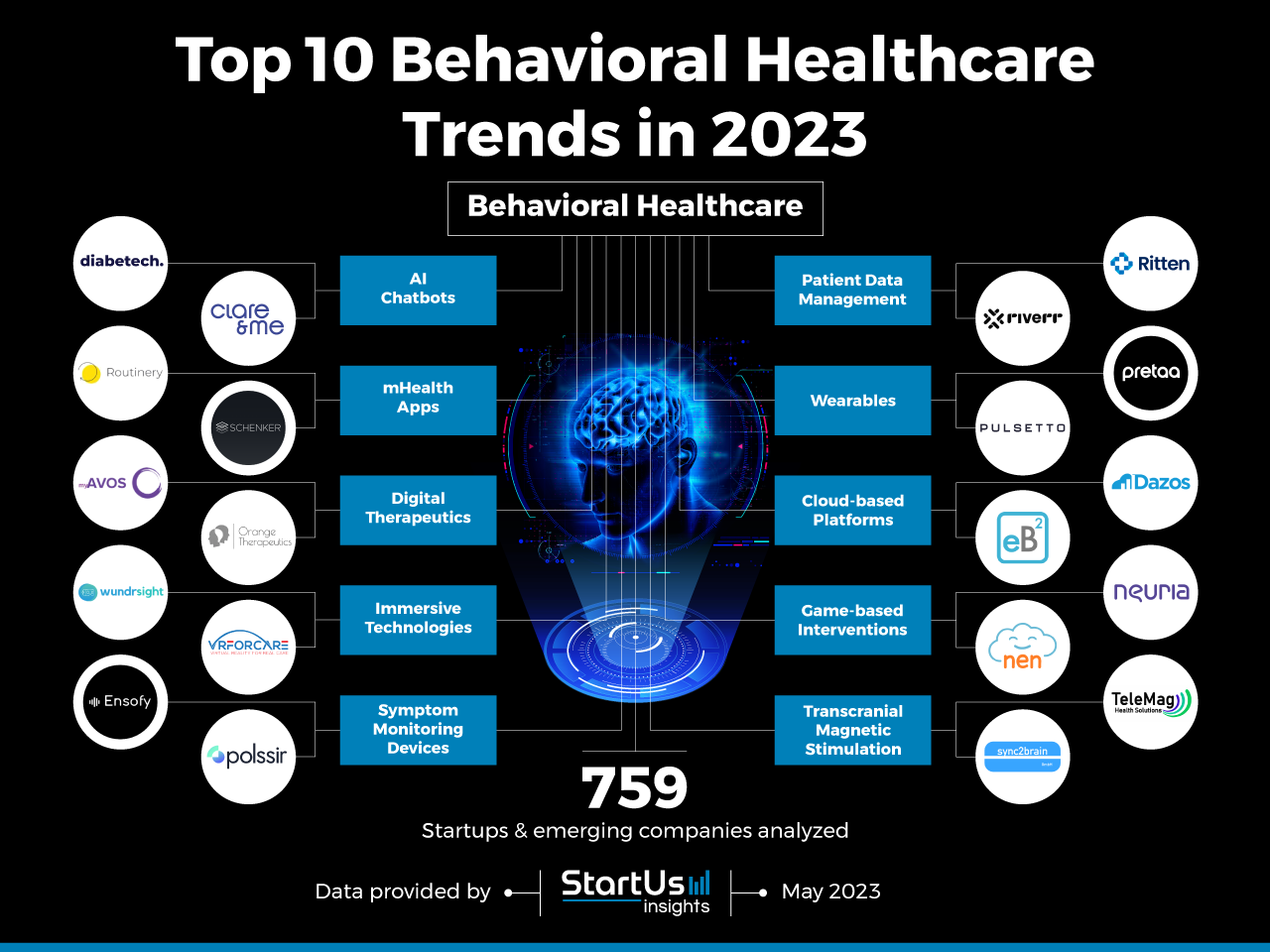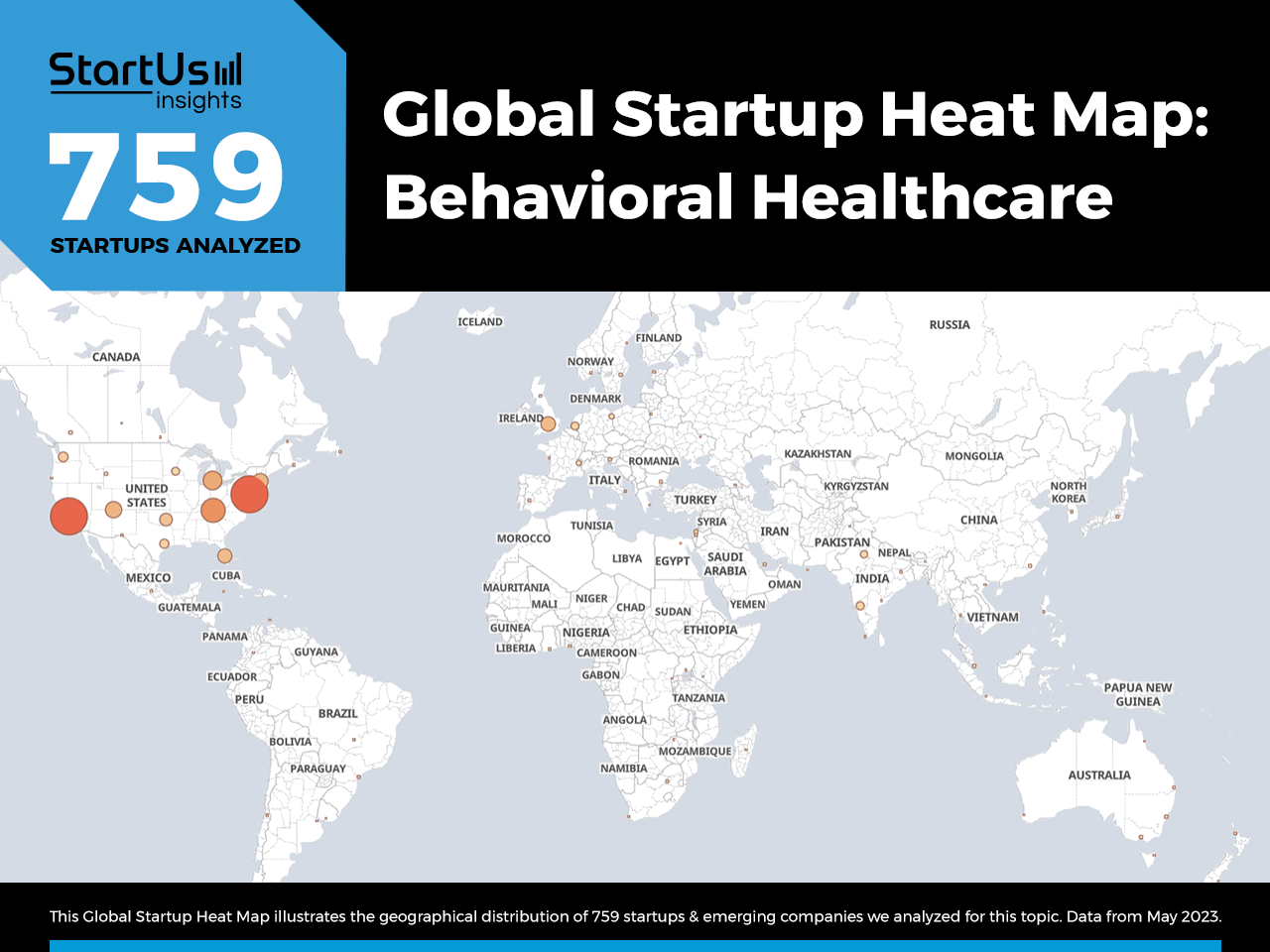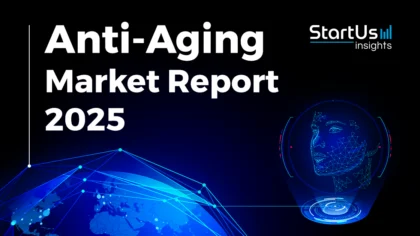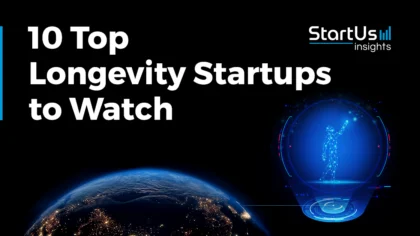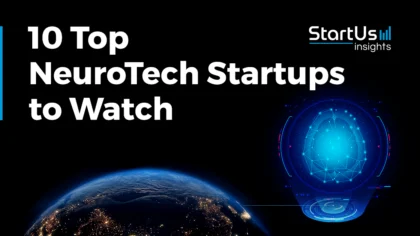Accelerate Productivity in 2025
Reignite Growth Despite the Global Slowdown
Increasing awareness and destigmatization of behavioral health issues and the impact of COVID-19 leads to the development of comprehensive behavior healthcare interventions. It is further advanced by technological progress, resulting in improved research, better patient outcomes, data-driven integrated approaches, and continuity of care. Startups develop artificial intelligence (AI)-powered chatbots, symptom monitoring devices, and wearables to advance remote patient monitoring. These innovations also empower digital therapeutics (DTx) and patient data management for expedited patient care. This report provides the top 10 behavioral healthcare trends and innovations in 2023. They range from mHealth applications to immersive technology and transcranial magnetic stimulation (TMS). Read more to explore the other trends and how they enhance care delivery.
Innovation Map outlines the Top 10 Behavioral Healthcare Trends & 20 Promising Startups
For this in-depth research on the Top Behavioral Healthcare Trends & Startups, we analyzed a sample of 759 global startups & scaleups. This data-driven research provides innovation intelligence that helps you improve strategic decision-making by giving you an overview of emerging technologies in the healthcare industry. In the Behavioral Healthcare Innovation Map, you get a comprehensive overview of the innovation trends & startups that impact your company.
These insights are derived by working with our Big Data & Artificial Intelligence-powered StartUs Insights Discovery Platform, covering 3 790 000+ startups & scaleups globally. As the world’s largest resource for data on emerging companies, the SaaS platform enables you to identify relevant technologies and industry trends quickly & exhaustively.
Tree Map reveals the Impact of the Top 10 Behavioral Healthcare Trends
Based on the Behavioral Healthcare Innovation Map, the TreeMap below illustrates the impact of the Top 10 Behavioral Healthcare Trends in 2023. AI chatbots, mHealth apps, and gamified interventions improve the delivery of therapeutic interventions and other supportive services. Similarly, healthcare startups provide prescription digital therapeutics targeted to remote patient populations while addressing the stigma associated with mental health and addiction. Immersive technologies enable accelerated staff training. Clinical-grade symptom monitoring devices, including wearables, improve health data collection and early diagnosis to ensure timely interventions. Similarly, startups build innovative big data platforms and interoperable electronic health records (EHRs) for effective management of continuous patient data inflow. Cloud computing further enables the digitization of behavioral healthcare facilities and the adaption of growing demand for telehealth and teletherapy. Lastly, startups are improving transcranial magnetic stimulation treatments and the effective delivery of the same for symptom improvement.
Top 10 Behavioral Healthcare Trends
- AI Chatbots
- mHealth Apps
- Digital Therapeutics
- Immersive Technologies
- Symptom Monitoring Devices
- Patient Data Management
- Wearables
- Cloud-based Platforms
- Game-based Interventions
- Transcranial Magnetic Stimulation
Global Startup Heat Map covers 759 Behavioral Healthcare Startups & Scaleups
The Global Startup Heat Map below highlights the global distribution of the 759 exemplary startups & scaleups that we analyzed for this research. Created through the StartUs Insights Discovery Platform, the Heat Map reveals high startup activity in the US, followed by the UK and India. Below, you get to meet 20 out of these 759 promising startups & scaleups as well as the solutions they develop. These behavioral healthcare startups are hand-picked based on criteria such as founding year, location, funding raised, & more. Depending on your specific needs, your top picks might look entirely different.
Top 10 Behavioral Healthcare Trends in 2023
1. AI Chatbots
AI-powered chatbots are accessible around the clock and provide data-driven access to mental health and substance abuse information and support. These are easily available through smartphones, computers, or other devices. Thus, allowing individuals to seek help at their convenience. Startups also develop generative AI-integrated virtual assistants that analyze patient interactions and personalize responses based on specific needs. These advanced machine learning (ML) and natural language processing (NLP)-based models provide personalized recommendations, coping strategies, and self-help techniques for crisis management. Additionally, these chatbots use AI algorithms to conduct initial mental health and addictive behavior screenings and extend psychoeducation. They identify potential symptoms and risk factors to enable early intervention and timely referrals to health professionals. AI-powered virtual therapists provide anonymous and non-judgmental support, addressing the stigma associated with seeking help for addictive behaviors.
Diabetech provides a Health Coach Service
UK-based startup Diabetech provides an AI-driven coaching service for better diabetic health management. The platform’s advanced AI assistant, Dani, offers health coaching in a conversational style using positive and energizing reinforcements. Dani communicates with users via their preferred messaging platforms, fostering behavior and lifestyle changes for better diabetic health. It assists and follows up with each patient on their health goals and assists in achieving these objectives. Diabetech enables diabetic patients to self-manage their symptoms and lifestyle. It also reduces the guilt associated with missed goals and human judgments.
Clare&me offers a Voicebot for Self-guided Therapy
German startup Clare&Me creates an AI-powered self-support program for individuals suffering from mental health issues. Clare is the startup’s AI voice coach that analyzes patients’ voices and messages to provide support. It incorporates self-help approaches developed by psychologists and guides users through self-reflective exercises and grounding techniques. Users share their feelings, discover patterns, and learn new tools to help themselves by calling or messaging Clare. Individuals dealing with anxiety, worries, and circulating thoughts use the startup’s platform to get continuous mental health support.
2. mHealth Apps
Mobile health applications enable users to access therapy tools, self-help resources, and communication channels with mental health professionals remotely. This trend in mental health allows patients and care providers to overcome the geographical barriers to timely interventions, evidence-based therapy, and counseling. mHealth apps advance self-management by tracking and managing mental health symptoms, moods, sleep patterns, and behaviors. This enables patients to gain insights into their own physical and mental well-being. The apps also let them identify patterns or triggers that hinder rehabilitation. In and out-patient departments (OPD) of hospitals and clinics utilize mHealth for patient education and awareness. This also addresses the healthcare workforce shortage. mHealth apps also feature peer support and community engagement for large populations. These features aid treatment adherence and improve patient outcomes.
Routinery builds a Habit Tracker App
Routinery is a South Korean startup that provides an eponymous mobile health platform to create personalized behavior change environments. The app takes patients’ routines, habits, and goals as inputs and offers a behavior change routine. It fosters automatic behavior change through habit stacking and timer-based alerts, eliminating the need for high willpower or motivation. Further, the platform analyzes behavioral types to provide hyper-personalized experiences, acknowledging the variability in behavior across different situations. Routinery provides behavior analysis and feedback by tracking habits and helps users to self-maintain healthy behaviors in the long run.
Schenker facilitates Smartphone Addiction Prevention
Schenker is a US-based startup that develops a smartphone platform that prevents unhealthy usage among smartphone users. The platform counteracts existing and new smartphone interface patterns from a psychological, behavioral, and neurological perspective. This breaks the usage patterns that showcase high behavioral addiction potential and prevent users from smartphone addiction and related health issues. Schenker’s approach does not limit the positive impacts of smartphones but focuses on modifying the technology to suit specific users. The platform aims to reduce mental health challenges, such as suicides and unhealthy lifestyles, arising from problematic phone usage.
3. Digital Therapeutics (DTx)
Startups in the field of digital therapeutics are responding to mental health trends and substance abuse concerns by offering evidence-based, scalable, and accessible interventions. Digital therapeutics platforms also deliver structured and personalized treatment for eating disorders, gambling and sex addiction, and more. These programs incorporate cognitive-behavioral therapy (CBT) techniques, mindfulness practices, psycho-education, and therapeutic exercises. Clinicians, psychotherapists, and other healthcare practitioners use web-based tools to prescribe digital therapeutic interventions, expanding access to care and reducing treatment barriers. Such mobile and web-based tools provide flexibility, allowing users to engage with therapy tools and resources at their own pace and convenience. Digital therapeutics also offers continuous monitoring solutions that enable patients and healthcare providers to assess progress, identify trends, and make data-driven treatment adjustments. Moreover, DTx offers digital pills, progress tracking, and therapeutic reinforcement strategies even to remote and inaccessible patient populations.
OptiChroniX provides Dementia DTx
US-based startup OptiChroniX builds myAVOS, a digital wellness application designed to support individuals affected by dementia. The app features a risk calculator that uses an AI algorithm to estimate patients’ risk for late-life dementia. Moreover, it offers a monthly cognitive assessment using a speech-enabled digital biomarker and a conversational interface to analyze the curated answer database. myAVOS integrates with smart wearables to capture lifestyle elements and provide personalized guidance on lifestyle changes by addressing these modifiable risk factors. Dementia caregivers, supporter groups, employers, and physicians use OptiChroniX’s platform to get insights on patient health status and improve treatment outcomes.
Orange Therapeutics develops Virtual CBT
US-based startup Orange Therapeutics provides software as a remedy solution for evidence-based, real-time therapeutic assistance. The startup provides conversational virtual human clinicians to augment and virtually deliver CBT and other therapies to various patient populations. It is further supervised by human clinicians under a medical practitioner or psychologist’s prescription. The platform targets various populations including women with postpartum depression, dementia patients, and individuals suffering from substance use, eating, or sleep disorders. Orange Therapeutics enables medical practitioners to provide prescription therapeutics remotely and ensure effective treatment adherence and behavior change outcomes.
4. Immersive Technologies
Virtual reality (VR), augmented reality (AR), and other immersive technologies offer interactive experiences that improve treatment adherence. Immersive therapies provide a controlled and safe environment for exposure therapy. They allow patients with anxiety disorders, phobias, or post-traumatic stress disorder (PTSD) to gradually confront their fears in a virtual setting. Therapists create realistic simulations and tailor the intensity of exposure to specific needs and promote personalized care. Similarly, immersive therapies facilitate the delivery of mindfulness-based interventions by creating virtual environments that promote relaxation, stress reduction, and emotional well-being. They further support pain management by distracting patients from discomfort and engaging them in experiences that alleviate pain perception. Lastly, healthcare institutions leverage immersive technologies to accelerate support staff training and enhance patient knowledge of their conditions and treatment options.
Wundrsight delivers Mixed Reality (MR)-based Interventions
Indian startup Wundrsight develops digital psychotherapeutic interventions for brain health, leveraging MR and AI. The platform builds research-backed immersive therapeutic virtual worlds where users confront their anxieties, stressors, or other health issues and receive systematic coaching. The use of mixed reality increases patient engagement and adherence compared to traditional methods. Neurocognitive, mental, and behavioral healthcare professionals utilize this platform to digitally deliver therapeutic interventions. This lets them achieve intended behavior changes much faster.
VRforCARE offers VR-based Drug Abuse Treatment
Italian startup VRforCARE provides DRIM, a drugs immersion platform. It is a VR-based platform for drug abuse treatment, prevention, and screening. The platform creates an immersive environment in which the users interact with multi-sensory stimulation related to substance use and addictive behaviors. The VR simulation provides real-life situations that expose patients to various substances of abuse and confront them with potential consequences. The patients are simultaneously monitored by a therapist who collects data on physiological responses throughout the virtual exposure. This is followed by an accurate assessment of risk factors and pathological addictions by the therapist to determine the most appropriate treatments. The startup’s platform includes solutions for various substances of abuse including cannabinoids, drugs, alcohol, and addictive risk behaviors like pathological gambling (GAP).
5. Symptom Monitoring Devices
Digital symptom tracking of various behavioral disorders is crucial for early detection during treatment, rehabilitation, or relapse, making it one of the top 5 trends in behavioral and mental health. Startups develop ML learning algorithms to capture data such as behavior patterns, speech impediments, and voice tonality for further analysis and timely interventions. These devices and applications use the internet of medical things (IoMT) to connect with healthcare systems and provide a comprehensive patient view. Likewise, computer vision-based early detection systems enable healthcare providers to gather real-time, quantitative data. This ensures more accurate assessments and treatment planning. Such IoMT devices also simplify continuous remote patient monitoring (RPM) at homes and hospitals. Combined with computational algorithms, these medical devices further detect changes in symptom severity, medication response, and treatment response to improve treatment efficacy.
Ensofy provides Voice Biomarkers for Mental Health
Georgian startup Ensofy develops VoiceAI, an AI tool that screens mental health disorders by analyzing the human voice. It leverages vocal biomarkers for non-invasive and early mental health condition screening by accurately detecting changes in patients’ speech patterns. Ensofy’s application programming interface (API) enables integration into various virtual or hybrid care platforms, enabling real-time and asynchronous mental health management. The platform is a decision support system (DSS) to assist mental health practitioners in managing their patients’ mental health more effectively.
Polssir enables Contactless Continous Behavior Monitoring
UAE-based startup Polssir builds a platform solution for remote, contactless, and continuous monitoring of health and behavior, for elderly and sedentary patients. The platform utilizes sensors to monitor vital parameters such as behavior and physiological states and its AI provides on-edge behavior analysis. In case of detecting any abnormality, it relays alerts to caretakers and treating doctors for immediate attention and response.

6. Patient Data Management
Patient data management systems enable healthcare providers to securely store, organize, and access patient information electronically, streamlining workflows. Startups build behavioral healthcare-focused EHRs and electronic medical records (EMRs) that centralize patient data management. Patient medical history, diagnoses, treatment plans, medications, and therapy notes from primary care doctors, specialists, and hospitals are compiled in EHRs. This facilitates seamless patient information exchange and care transition between different healthcare providers, ensuring continuity of care and reduced risk of errors. These innovations also enhance clinical decision-making by providing real-time access to comprehensive patient data. Hence, enabling more accurate diagnoses and personalized treatment plans. Evidence-based practices use big data management systems for optimized resource and skilled staff allocation resulting in the best patient outcomes. Further, startups are developing interoperable health record systems to improve efficiency and cost-effectiveness by reducing paperwork, minimizing errors, and streamlining administrative processes.
Ritten offers EMR for Addiction Treatment
US-based startup Ritten develops a behavioral health EMR for addiction and mental health treatment professionals. The platform enables data-informed care using e-documentation, appointment and staff scheduling, attendance tracking, as well as compliance and medication management. It analyzes critical information from routine physician notes and assessments to provide insights into individual patient trends, improving clinical outcomes. Outpatient group practices, detox, and residential treatment facilities use Ritten’s EMR to streamline their workflows and improve revenue opportunities.
Riverr enables EHR Data Interoperability
Singaporean startup Riverr builds an eponymous platform that securely connects patient data across various health data sources and enables data exchange. The platform provides modules for patient information sharing, interoperability, data standardization, and harmonization, health data visualization, and virtual collaboration. The startup’s ReACT Health platform leverages AI to predict health problems, enabling early diagnosis and intervention. Further, the platform offers appointment scheduling, payment handling, and lab testing specimen tracking. Riverr equips behavioral healthcare practices with unified EHR data that enables intelligent prioritization and longitudinal patient tracking for accurate clinical insights.
7. Wearables
Wearable devices such as smartwatches and fitness trackers, offer various features that aid mental health and behavioral wellness tracking. These include continuous monitoring of physical activity, sleep patterns, heart rate, and other physiological factors to offer insights into improvement areas. Startups build smart wearables for automated treatment adherence reminders, portable intervention delivery, non-invasive data collection, and get feedback on patient behavior. Additionally, clinically-approved wearables accurately diagnose early signs by tracking mood fluctuations and emotional states. Wearable technology empowers individuals to make informed decisions about their mental health and take proactive steps toward self-care. It also facilitates connectivity and social support through shared fitness goals and challenges, fostering peer-to-peer (P2P) support.
Pretaa offers Behavior Change Analytics
US-based startup Pretaa develops software that analyzes data from wearable devices and extends support to care providers. It monitors data such as physical activity, sleep, oxygen levels, and heart rate and provides insights to introduce positive behavior change. The software empowers patients and care teams to engage in self-learning and improve ongoing engagement. This, in turn, improves the response to behavioral health concerns. Rehabilitation and healthcare facilities use Pretaa’s software to monitor patients suffering from substance abuse and alcohol use disorders, and process addictions, among other concerns.
Pulsetto advances Vagus Nerve Stimulation (VNS)
Lithuanian startup Pulsetto builds a wearable device and connected smartphone application that uses non-invasive pulse therapy to reduce stress and anxiety and improve sleep. The startup’s device stimulates the vagus nerve, which activates the parasympathetic nervous system, leading to a calmer and less anxious state. It offers multiple sessions for sleep improvement, anxiety and stress reduction, and pain management. The device’s companion app also allows users to regulate the intensity of the stimulation and features a sound library for auditory stimuli. The startup’s products offer adjuvant treatments to ongoing mental and behavioral health therapies as well as address the atypical behaviors related to mental issues.
8. Cloud-based Platforms
Cloud computing brings scalability, security, and collaboration to behavioral healthcare clinics and hospitals. Platforms hosted on the cloud enable secure storage and access to critical patient information, which improves care coordination. They support real-time patient records access and simultaneous updation by multiple providers, facilitating informed decision-making and coordinated treatment plans. Cloud-based platforms also offer robust security measures, such as data encryption and strict access controls, to ensure the confidentiality of sensitive patient information. Startups utilize cloud platforms to enhance collaboration among healthcare teams by enabling real-time communication, file sharing, and remote consultations. Further, cloud solutions reduce the data management burden on healthcare organizations by removing on-premise IT infrastructure.
Dazos streamlines Rehabilitation Customer Relationship Management (CRM)
US-based startup Dazos offers a suite of business intelligence (BI) tools tailored for substance abuse and behavioral health treatment. The startup’s Dazos CRM platform optimizes the patient journey from lead generation to treatment and discharge. It also tracks admissions, marketing campaigns, referrals, treatment history, and revenue cycle. This cloud platform automates admissions and aids in decisions making in multi-clinic settings. Hospital and clinic chains use Dazos’ platform to seamlessly integrate behavioral health programs and services in each center.
Evidence-Based Behavior (eb2) simplifies Behavioral Assessments
Spanish startup Evidence-Based Behavior offers a cloud-based behavioral analytics platform to manage emotional well-being, chronic diseases, and occupational health. Its eB2 Behavioral Analytics platform provides behavioral assessment services integrated into pre-existing eHealth applications and systems. The platform aggregates patient data from disparate medical devices and clinical systems as well as provides behavioral biomarker computation services. This equips mental and behavioral health companies with behavior modeling services and delivers an intuitive system customized to their needs.
9. Game-based Interventions
Gamification leverages the interactive nature of games to promote behavior change and increase patient motivation. Game-based interventions create immersive and enjoyable experiences that capture patients’ attention and maintain their engagement during therapies. Such prescription video games provide a structured environment for individuals to practice and reinforce therapeutic techniques, like CBT or social skills training. Gamified therapeutics incorporate game elements into non-game contexts, making treatment adherence more enjoyable, motivating, and rewarding. Startups also build customized gaming interventions catering to specific needs and advance personalized and adaptive experiences. Additionally, gamified edutainment ensures retention, particularly among younger populations or individuals with limited attention spans. It creates a positive and supportive atmosphere that reduces stigma and encourages individuals to actively participate in their own mental health management. Further, such solutions provide behavioral healthcare professionals with real-time data on patient performance, progress, and preferences.
Neuria delivers Video Game-based Behavioral Interventions
Swiss startup Neuria develops science-based gamified digital therapies and interventional programs targeting excessive consumption behaviors such as unhealthy food, alcohol, or tobacco. The startup utilizes its patented technologies to develop video games for behavioral change and cognitive recovery that targets implicit brain processes. It also offers customized gamified digital therapies, cognitive interventions, diagnostics, patient profiling, and usage data analytics. The startup creates digital interventions and methodological protocols for scientists, clinical institutions, and healthcare organizations, advancing large-scale studies and clinical trials.
nen provides Gamified Pain Management
Spanish startup nen offers an evidence-based web platform for pediatric cancer pain and well-being management. Its DTx platform facilitates pain management by combining gamification and CBT modules. It assesses, treats, and offers continuous feedback to children based on their treatment journey through age-appropriate games. Nen’s software platform enables pediatric oncologists and patient parents to better manage cancer treatment-related pain and its progression effectively.
10. Transcranial Magnetic Stimulation (TMS)
TMS offers a non-invasive, targeted, and precise treatment modality for conditions such as depression, anxiety, and other psychiatric disorders. Innovations in TMS offer significant implications for patients who do not respond well to traditional therapies or medications. Since this alternative therapy shows minimal systemic effects, startups increasingly build advanced and portable TMS solutions to treat more patients. It also provides a non-pharmacological option for pregnant or breastfeeding individuals who require treatment for mental health conditions. TMS is targeted to specific brain regions based on specific characteristics and neuroanatomical factors. Hence, it advances precision behavioral healthcare. Novel TMS addresses the challenges of medication resistance, treatment tolerability, and limited therapeutic options while helping patients achieve remission and improve mental well-being.
TeleMag Health Solutions provides Portable repetitive TMS (rTMS)
Canadian startup TeleMag Health Solutions makes a portable rTMS solution for treating mental health disorders. It utilizes magnetic pulses directed into the brain to alter neuronal responses that are as effective as clinical models. Its portability makes rTMS suitable for small psychiatric practices or at-home use. The startup’s solution makes TMS treatment more accessible and affordable to smaller hospitals, clinics, psychiatric practices, and therapists.
sync2brain builds TMS Stimulators
German startup sync2brain develops TMS stimulators that enhance the efficacy of TMS therapy for conditions like stroke and depression. The startup’s bossdevice is a brain oscillation state sensor. It reads real-time electroencephalogram (EEG) data and triggers brain stimulation during pre-defined oscillatory brain states. It enables the study of transient large-scale dynamics of the human brain. Thus, advancing the therapeutic potential of non-invasive brain stimulation. The startup accelerates personalized TMS experimentations and therapy to improve or replace other therapy forms affordably.
Discover all Behavioral Healthcare Trends, Technologies & Startups
The behavioral healthcare industry is undergoing a positive technological transformation. Technologies such as blockchain and quantum computing already show potential for high volumes of sensitive patient data processing, security, and interoperability. The overall goal of these technologies is to make the treatment more patient-centric, data-driven, effective, and inclusive. The stigma and cost associated with behavioral healthcare interventions only showcase a downward trend owing to the above technology innovations. Going forward, population and general mental and behavioral wellness prevention and management come across as a recurring theme. Startups and scaleups utilize digital tools, edge computing, and the internet of things (IoT) to optimize the end-to-end delivery of behavioral health treatment protocols.

